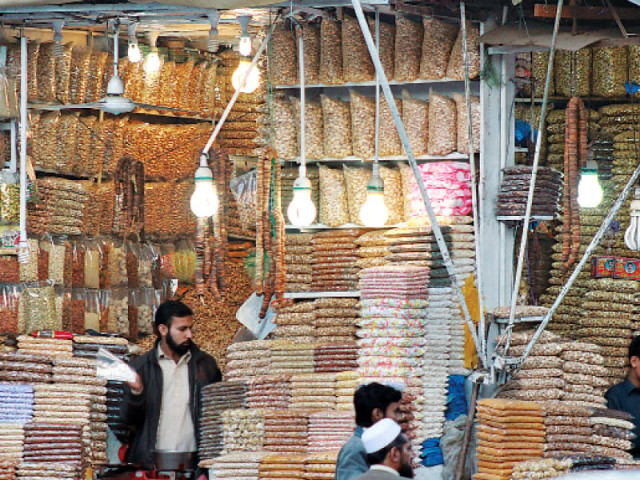Open market: The knotty problem in pricing nuts
Wholesalers say the cost of procuring dry fruit, bribing officials and paying taxes makes it hard to keep rates low.

A dry fruit shop in Saddar Of late, local production has fallen and caused the inevitable shortage-related spiral in prices in the unregulated market. PHOTO: MUHAMMAD IQBAL/EXPRESS
Without price monitoring, the cost of dry fruit continues to increase rapidly in both wholesale and retail markets.
A large amount of dry fruit comes from Afghanistan through different routes, including Torkham, Ghulam Khan and Thal-Parachinar Road. There are several other routes which are taken to avoid official border crossings where income tax officials impose surcharges. Certain dry fruit and herbs which make their way across the border are for the production of herbal medicines.
Some dry fruit is also produced in Dir, Chitral and Parachinar. Of late, local production has fallen and caused the inevitable shortage-related spiral in prices in the unregulated market.
“There is no proper mechanism of fixing rates,” said Faiz Muhammad, a dry-fruit dealer. “It is the traders who fix rates after importing the products from Afghanistan.” Muhammad shared there are around 100 dealers in Peshawar associated with this business. These dealers supply dry fruit to almost every city in the country and also export their products.

“Even though we pay our taxes at border posts, officials at other checkpoints also have to be paid; they have made our legal work illegal, increasing the cost,” complained Ameer Muhammad Khan, a wholesale dealer in Namak Mandi, Peshawar.
“There is no notion of legal and illegal, the price is decided according to the cost incurred. This includes ‘black taxes’ paid at check posts.”
“The whole system is corrupt and no one can bring it on track,” claimed Khan.
Khan not only provides dry fruit to stores in Peshawar but to other cities of Punjab as well. He explained without any price control, the market remains an open one where rates are set by each wholesale dealer.
There are also vast differences between wholesale and retail rates. According to the trader, the wholesale rate of pine nuts stands at Rs800 to Rs1,600 (shelled) per kilogramme (kg), however, pine nuts are available at a pricey Rs2,200 per kg in the open market .
Similarly, almonds are available at wholesale markets for Rs260 to 600 (blanched) per kg and for almost Rs700 per kg at general stores. Figs, which are also used in herbal medicines, sell from Rs270 onwards in bulk and at a slightly pricier rate of Rs350 per kg.
Peanuts are available at a rather reasonable rate of Rs180 per kg but at retail, the cost goes up by 30%.
According to Khan, most of the rates increased as the mercury dropped at the start of the season.
Traders also blame Afghan merchants who smuggle products without any additional taxes, sell their goods and undercut the wholesale price schedule.
Published in The Express Tribune, November 17th, 2013.



















COMMENTS
Comments are moderated and generally will be posted if they are on-topic and not abusive.
For more information, please see our Comments FAQ